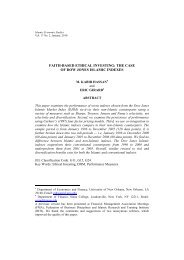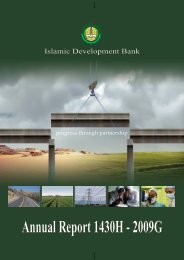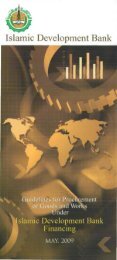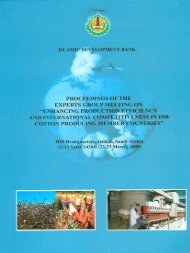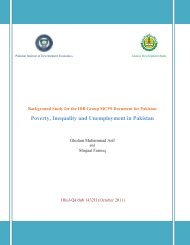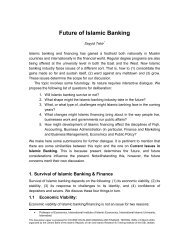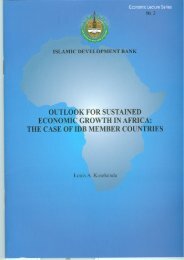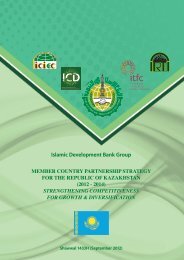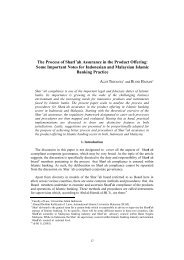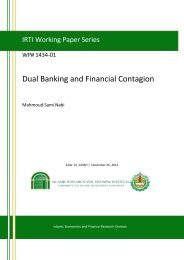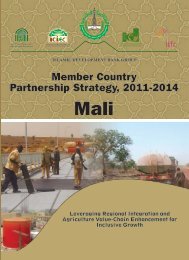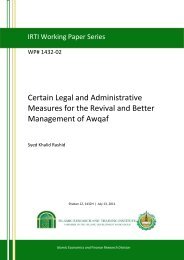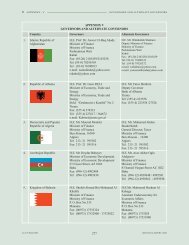Country Economic Work for Malaysia - Islamic Development Bank
Country Economic Work for Malaysia - Islamic Development Bank
Country Economic Work for Malaysia - Islamic Development Bank
You also want an ePaper? Increase the reach of your titles
YUMPU automatically turns print PDFs into web optimized ePapers that Google loves.
y the United States (MYR2.3 billion); Singapore (MYR1.9 billion); the Netherlands<br />
(MYR1.2 billion); and Taiwan (MYR1.2 billion).<br />
Binding Constraint to Attracting FDI<br />
116. To attract more FDI inflows, <strong>Malaysia</strong> has had to implement more liberal economic<br />
policies similar to those implemented by Singapore and Indonesia. The UNCTAD report<br />
attributes the strong FDI inflows into the high per<strong>for</strong>ming Southeast Asian countries as being<br />
due to proactive policy ef<strong>for</strong>ts by the various Governments to attract FDI inflows. The release<br />
of the New <strong>Economic</strong> Model, the institutionalization of PEMANDU, the <strong>Economic</strong><br />
Trans<strong>for</strong>mation Program and the Government Trans<strong>for</strong>mation Program together with the<br />
release of the Tenth <strong>Malaysia</strong> Plan have given positive signals to the <strong>for</strong>eign investors that the<br />
Government is committed to creating a more market friendly environment in <strong>Malaysia</strong>.<br />
iv.<br />
Conclusion<br />
117. Based on the above analysis, Table 5.1 highlights a number of constraints hampering<br />
overall private sector development as well as PPPs, SMEs and private resource mobilization<br />
in <strong>Malaysia</strong>.<br />
Table 5.1. Summary of Constraints to Private Sector <strong>Development</strong> in <strong>Malaysia</strong><br />
Components of Private Sector <strong>Development</strong><br />
Constraints<br />
Private Sector <strong>Development</strong><br />
Public Private Partnership (PPPs)<br />
<br />
<br />
<br />
<br />
<br />
<br />
<br />
<br />
Inadequately educated work<strong>for</strong>ce, difficulties in dealing<br />
with tax administration and getting business licenses and<br />
permits<br />
Firms find it difficult to locate and recruit the skills they<br />
seek<br />
In terms of enrollment in secondary and tertiary<br />
education, the challenges remain even more substantial<br />
Weak innovation and business sophistication and low<br />
budget <strong>for</strong> research and development (R&D) activities<br />
Weak innovation system is hindering the private sector<br />
development in the country<br />
Land acquisition issues/disputes settlements take longertime<br />
to resolve, particularly <strong>for</strong> road projects<br />
Lack of project supervision and support<br />
Ensuring adequate resources<br />
Small and Medium Enterprises (SMEs)<br />
Private Sector Resource Mobilization<br />
<br />
<br />
<br />
<br />
<br />
<br />
<br />
Insufficient access to funding sources<br />
Weak access to markets<br />
Poor ability to absorb and retain good talent in the<br />
industry<br />
Insufficient availability of skilled work<strong>for</strong>ce<br />
Shortage of <strong>Islamic</strong> instruments<br />
Lack of innovation<br />
Shortage of skilled and experienced professionals in<br />
<strong>Islamic</strong> finance industry<br />
54




